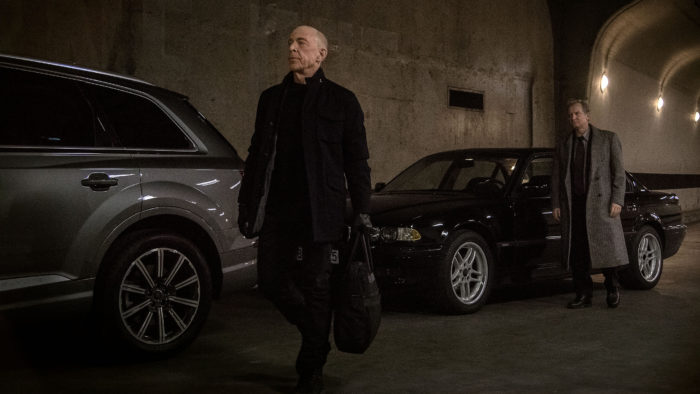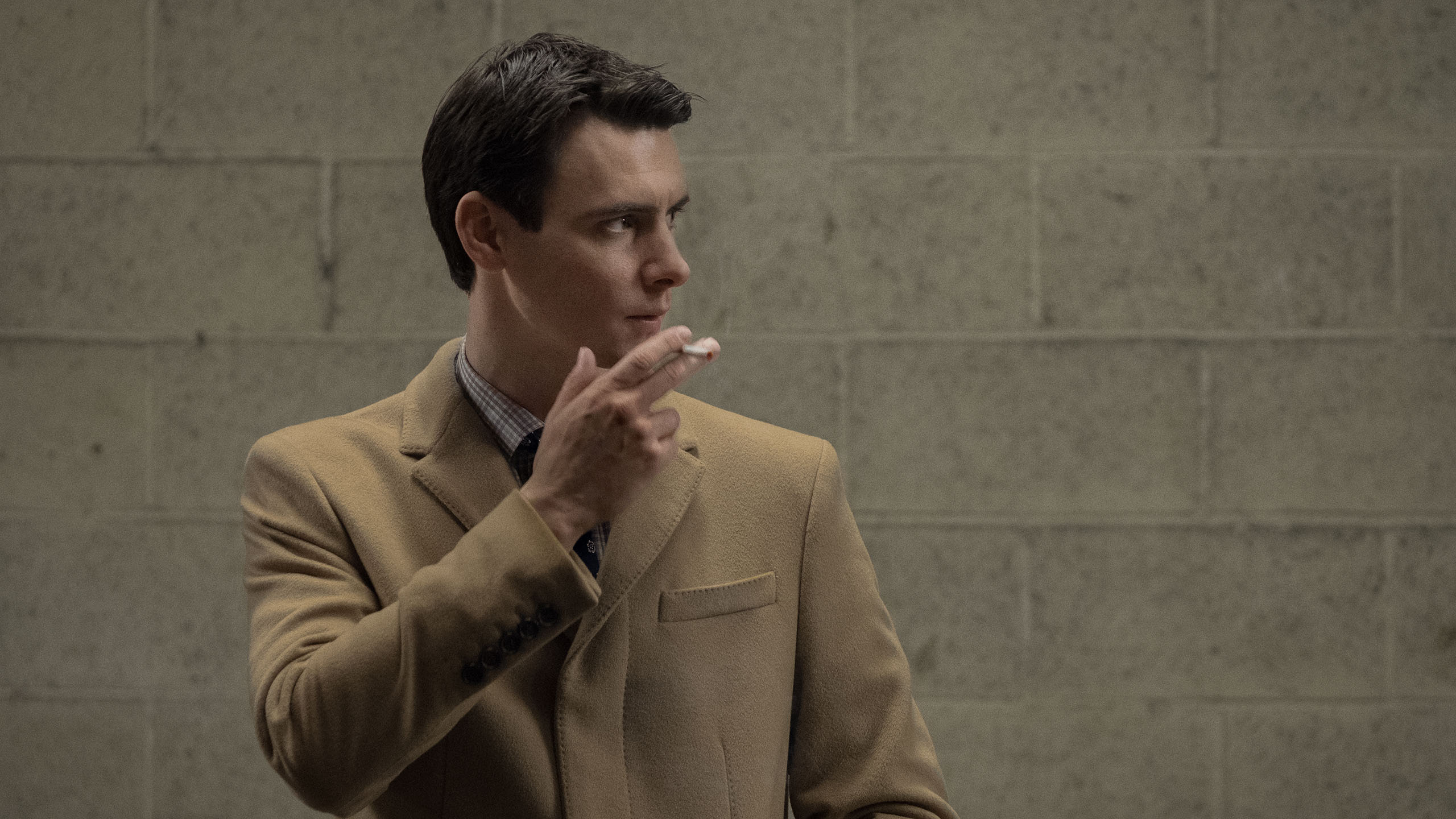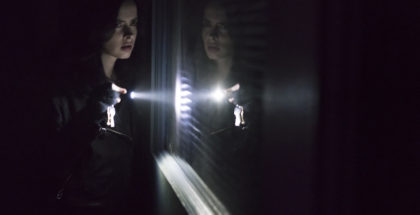Counterpart: The best TV show of 2018 you haven’t seen
Review Overview
Ambition
10Surprises
10J.K. Simmons
10David Farnor | On 06, Dec 2018
As Counterpart Season 2 premieres on Sunday 9th December, we take a spoiler-free look back at Season 1 – and why you should be watching.
“I know you. You know you. And I know you know that I know you.” Those are the words of Ben Stiller in Dodgeball, and that quote comes to mind when watching Counterpart, Starz’s bold, daring, gripping and stylish TV show, which asks big questions about identity, nature, nurture, and parallel universes.
The series stars J.K. Simmons… and J.K. Simmons. He plays Howard Silk, a low-ranking officer worker in Berlin’s Office of Interchange. His life is one of unquestioning routine. He goes to work, he swaps codes with an anonymous suit, and then he returns home, before going to hospital to visit his comatose wife, Emily (Olivia Williams). But just as he begins to ask questions – what he’s doing, why he can’t have a promotion – he finds himself hauled into a meeting with another man, who looks exactly like him.
He’s also Howard Silk, but from another Berlin; ever since a parallel world emerged in the German capital, the Office of Interchange has been monitoring and maintaining the border. Howard Prime (from the other world) has crossed over, a spy come in from the cold to inform them that rogue agents have been sent over the bridge to bump off operatives on our side. The only way he can stop them? By impersonating Howard Alpha (from this world) and tracking them down.
It’s a fantastic hook for a TV show, and one that Simmons revels in. One of the top actors around, he delivers one of the year’s best performances – twice over – as Howard and Howard. So much of the show’s fun lies in admiring the distinction between the two men, who are one and the same but entirely recognisable; even the slightest change in the way he walks or looks at people marks out Howard from Howard, one of them a confident, cool and callous spy, the other a brow-beaten, sentimental, soft-hearted husband. One of them reads poetry to his unconscious partner, always remembering to take flowers to put in a vase on hospital reception. The other carries a gun and infiltrates other universes without breaking a sweat.
Seeing them interact together is even better than seeing them apart, as the pair challenge each other to be more like them – what they see as the correct version of themselves. But what begins as a fun game of spot the difference finds infinite depth in the fact that the too are more similar than not, as Counterpart explores the elements of Howard’s personality that appear to exist in both men. Is there one innate nature that’s been shaded by the nurture of life’s circumstances? Or has nurture pulled them too far apart to recognise what they have in common. This is an espionage drama that’s part Cold War thriller and part philosophical meditation on the horror, surprise and necessity of knowing yourself.
If all that sounds like a lot for a TV show to tackle, you’d be right, but showrunner Justin Marks has a dizzying handle on what he’s created, and the storytelling nous to deliver on that ambition. The show paces itself just slow enough at first to allow the world to build, and just fast enough to keep you hooked as that world expands and contracts with each new twist in the plot. Because Howard is the cornerstone on which a whole universe is founded: if he has a Prime double, then doesn’t every other character? And if that’s the case, just how similar are they? Or, if they’re as smart as Howard Prime, can they appear similar enough to have already smuggled themselves into our world?
It’s a breathtakingly complex and constantly winding tapestry of twins and traitors, a theme that’s perfectly matched by the show’s genre; in an age where everyone is afraid of The Other, the idea that The Other might be one of Us all along is an elegantly gripping concept. And yet, as wide as Counterpart’s horizons reach, it’s strength lies in the way it brings everything back to its starting point – the personal impact of these political, and philosophical, dilemmas.
One of the most impressively subtle things about the show is the way that Simmons’ supporting cast all react differently to Howard, depending on which one they’re dealing with. But those nuances also bring shades to their own characters, as they navigate their own labyrinth of appearance, reality and inner constants.
Olivia Williams’ Emily, thankfully, gets more to do as the season unfolds, and that growing role brings unexpected sides to what begins as a thankless character – she emerges as one of the most important figures in the season, and, most impressive of all, that’s not solely in terms of her relation to her husband; we see her at work, determined and focused, and learn the full tragedy of her family history, one that comes to define a significant divider in the line between the Prime and Alpha worlds. Relationships are opened up, loyalties questioned and humanity tested – and that’s just one subplot of many.
Equally compelling is the arc of Peter Quayle, a senior manager in the Alpha world at the Office of Interchange. Obtaining the role by privilege of family connections, he’s initially a useless figure of incompetence, played with a wonderfully twitch quality by Harry Lloyd. But over the course of 10 episodes, he becomes a victim of circumstance as much as maintainer of status quo, and his responsibility to balance both things, along with his marriage to his wife, Claire (Nazanin Boniadi), reaches a heartbreaking crescendo by the finale. He learns to compromise and adapt, each new decision both weakening his power and strengthening his character.
Even in the most apparently incidental stories, Marks and his team find moving consequences of this divisive scenario; one sees a child having to break her legs, so that she can mimic her injured counterpart in Berlin’s mirror And yet behind that sacrifice is an even more poignant, and more determined truth, one that lies at the root of the disharmony between the two reflections.
In between these diverging images and echoes are a number of mysterious players, from Sara Serraiocco’s hitwoman, Nadia, to Nicholas Pinnock’s veteran peacekeeper Ian, who juggle intimidating purpose and intriguing ambiguity with superbly elusive chemistry.
Their moves, and all the others on this checkered chessboard, make for a rollicking, hugely suspenseful ride through familiar genre beats, each one given a fresh injection of novelty and a dark note of surprise. And, at the centre of it all, lie two men both finding themselves in alien territory, each one taking on traits of the other. A fantastic two-part finale returns us to the show’s central thesis, that identity is fluid, and that nurture can lead our nature to react in new ways – if everyone treats Howard Prime as Howard Alpha, it’s only natural that he should start to become more like him, and vice verse.
There’s a timeless horror in confronting one’s doppelgänger, and terror in getting to know one’s self as a result. But, scariest of all, is getting to know yourself, only to know that yourself can change. The result is a TV series of endless possibilities, a rare example of a story where you have no idea what will come next – and that makes the prospect of Season 2, which arrives on STARZPLAY this week, all the more thrilling.
Counterpart is available to watch online in the UK on STARZPLAY, a streaming service that costs £4.99 a month. The platform is available on Virgin Media On Demand or through Amazon Prime Video, both as an add-on subscription to your existing account.























